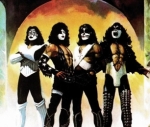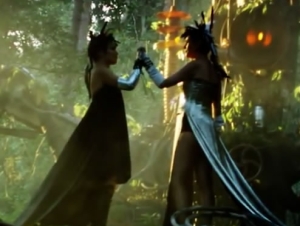By Joanie Connell and John Thornburgh
Let ’s face it: women in the workplace aren’t exactly known for supporting each other.
’s face it: women in the workplace aren’t exactly known for supporting each other.
Rosa Brooks exemplifies this with her recent Washington Post op-ed piece titled “Recline, don’t ‘Lean In’ (Why I hate Sheryl Sandberg).” In the op-ed, Brooks attacks Sandberg’s “meticulously coiffed hair,” among other things. Can you imagine a man writing a piece like this? While Brooks’ article raises many points worthy of consideration, it’s unfortunate that she preyed on the stereotype of women cat-fighting to grab the attention of the media. The documentary film Miss Representation captures many more examples of how women tear down other women in the workplace and the media.
Research supports the notion that women don’t support women at work. For example, the 2014 Survey by the Workplace Bullying Institute found that women who bully target other women 68% of the time, whereas men who bully tend to target both men and women more equally (43% and 57%, respectively). “Why do mature, normally reasonable women do this to each other?” Asks Lisa Quast in her recent Forbes article. Good question! Quest offers many reasons, as does Amy Tennery in her recent article in Time. Competitive threat, stereotype threat, lack of training in team sports, and tokenism in a male dominated business world are a few explanations given.
Alice Eagly and Linda Carli, in their thoroughly researched book, Through the Labyrinth, explain that women have to be assertive yet feminine and work their way up the ladder in a more subtle, convoluted way than men. If women act like men, they are perceived as “bitches” (our word not theirs). That is a fate worse than death to any aspiring business woman. It doesn’t have to be this way though and women heavy metal singers are proving it.
book, Through the Labyrinth, explain that women have to be assertive yet feminine and work their way up the ladder in a more subtle, convoluted way than men. If women act like men, they are perceived as “bitches” (our word not theirs). That is a fate worse than death to any aspiring business woman. It doesn’t have to be this way though and women heavy metal singers are proving it.
You don’t have to be a fan of heavy metal music to recognize that it is the epitome of a male dominated culture. The “good old boys” consist of Aerosmith, Metallica, Van Halen, Scorpions, and Black Sabbath, to  name a few. They are a menacing, shrieking, growling, aggressive bunch, and metal fans aren’t known for being particularly feminist. Discussion boards on metal sites such as Blabbermouth.net are filled with misogynistic comments about how women don’t belong, and when one leading female-fronted band opened for Metallica in France, the audience booed as soon as the band took the stage. Record labels haven’t always helped either. For example, Delain singer (and Gender Studies graduate student) Charlotte Wessels had to fight efforts by her previous label to Photoshop her legs.
name a few. They are a menacing, shrieking, growling, aggressive bunch, and metal fans aren’t known for being particularly feminist. Discussion boards on metal sites such as Blabbermouth.net are filled with misogynistic comments about how women don’t belong, and when one leading female-fronted band opened for Metallica in France, the audience booed as soon as the band took the stage. Record labels haven’t always helped either. For example, Delain singer (and Gender Studies graduate student) Charlotte Wessels had to fight efforts by her previous label to Photoshop her legs.
How have women broken into the male-dominated metal culture? If you aren’t a fan of heavy metal music, you might be surprised to know that there is a strong feminine presence developing. If you are an American (metal fan or not), you may be particularly unaware of this trend. That is because it’s largely a European trend. (Coincidentally, European business women are faring better than American ones too. What’s up, America?)
Women in business could learn a thing or two from women in metal. They know how to support each other and break into a male-dominated business.
What are female heavy metal singers doing that gets them ahead? First of all, they are not afraid to be themselves—feminine and beautiful and a stark contrast to the male singers. Secondly, they are notoriously supportive of each other. For example, established women metal singers regularly collaborate with up-and-coming artists they like, helping them to grab the spotlight. For example, Amy Lee of Evanescence performed with up-and-comer Lzzy Hale of Halestorm several times recently while they were on tour together. This helped promote Halestorm’s breakthrough. Lee explained: “It’s cool to have another female on the road. Not just because it inspires me musically—because it does—it makes me feel this sort of pride and ‘yeah, go get’em’ when I see a chick rocking.”
 Highly successful women metal singers, far from being divas who want all the glory for themselves, also regularly collaborate on each other’s albums. This delights fans and is a win-win for the artists. For example, Tarja Turunen (ex-Nightwish) appeared with Sharon den Adel on Within Temptation’s latest album. In the “making of” video, Sharon relays that the media had been pitting the two singers against each other for years and asking the two of them to comment on each other, even though they had never met. When they finally did meet for this endeavor, they clicked instantly and sang a beautiful duet together.
Highly successful women metal singers, far from being divas who want all the glory for themselves, also regularly collaborate on each other’s albums. This delights fans and is a win-win for the artists. For example, Tarja Turunen (ex-Nightwish) appeared with Sharon den Adel on Within Temptation’s latest album. In the “making of” video, Sharon relays that the media had been pitting the two singers against each other for years and asking the two of them to comment on each other, even though they had never met. When they finally did meet for this endeavor, they clicked instantly and sang a beautiful duet together.
Women in metal are also highly supportive of each other online. They promote each other’s work on Facebook, and for a time even had an official support network called Eve’s Apple with over forty members worldwide. This group  recently declared “mission accomplished” and ended its formal role, but the members remain sisters who look out for each other and advise each other about the music business. One of Eve’s Apple’s leaders, VK Lynne, explains “in the media today, competition between women is very pervasive. It’s not just talked about. It’s fostered, and it’s supported, and it’s encouraged. And at Eve’s Apple, we believe that not only is that not healthy but we simply don’t want it and so we won’t do it.” There’s nothing stopping women in the more traditional workplace from doing the same.
recently declared “mission accomplished” and ended its formal role, but the members remain sisters who look out for each other and advise each other about the music business. One of Eve’s Apple’s leaders, VK Lynne, explains “in the media today, competition between women is very pervasive. It’s not just talked about. It’s fostered, and it’s supported, and it’s encouraged. And at Eve’s Apple, we believe that not only is that not healthy but we simply don’t want it and so we won’t do it.” There’s nothing stopping women in the more traditional workplace from doing the same.
It’s okay to be different from men and sometimes it’s even better.
What if women business leaders started just being themselves instead of tirelessly tight-roping across the line between masculine assertiveness and feminine modesty? There is  already research out there that shows companies with gender-diverse management boards perform better. What if women were valued for being women in the world of business? If women supported women, there might be enough women leaders to make that happen. Female heavy metal singers have; they are definitely not like men and no one wants them to be.
already research out there that shows companies with gender-diverse management boards perform better. What if women were valued for being women in the world of business? If women supported women, there might be enough women leaders to make that happen. Female heavy metal singers have; they are definitely not like men and no one wants them to be.
Share the spotlight with an up-and-comer.
How cool would it be if high profile women business leaders helped up-and-coming women to “grab the spotlight?” Men do that for each other. It’s called “sponsoring” someone. It’s putting your name on the  line for the other person’s success and highlighting the other person to help them get ahead. Women tend to avoid this and see more junior women as a threat. For example, as reported in Science Magazine, a recent study found that, “in academia, women collaborate less with their same-sex juniors” than men do. Women see that there are so few slots available to women in the higher echelon that they don’t want someone else to take theirs. If there were more women in the higher echelons, women wouldn’t see other women as threats because there would be room enough for everyone.
line for the other person’s success and highlighting the other person to help them get ahead. Women tend to avoid this and see more junior women as a threat. For example, as reported in Science Magazine, a recent study found that, “in academia, women collaborate less with their same-sex juniors” than men do. Women see that there are so few slots available to women in the higher echelon that they don’t want someone else to take theirs. If there were more women in the higher echelons, women wouldn’t see other women as threats because there would be room enough for everyone.
Metal women singers see other women as helping their cause, not hindering it—the more the better. As explained by French singer Clémentine Delauney, “[We] can help and protect each other instead of being rivals. … There are not a limited number of places in the scene. Jealousy is ridiculous and doesn’t help you get better.” When metal women singers sponsor other women, the only threat to them is if the women don’t do a good job. Thus, they do their best to bring the other women up, not push them down. At Eve’s Apple: “We wanted to help new singers understand the music industry and we wanted to show everybody that the female fronted rock/metal scene is not about bitch fights, gossip and diet marathons. It was the beginning of a new family and a whole new world opened up to many of us when we found out that we are not alone—and not lonely—in this business.”
Move from collaborative to collaborating.
Women are known for having a more collaborative leadership style than men, but that is not the same thing as collaborating. The collaborative leadership style is more democratic and consensus-driven than directive and authoritarian. Although women may be more collaborative, they don’t necessarily collaborate with each other.
A photo essay in BusinessWeek shows 11 business partnerships that changed the world, like Steve Jobs and Steve Wozniak. They are almost entirely partnerships between men and none are entirely between women. What would it look like if women leaders collaborated with each other to change the world? Women in music are leading the way. In addition to heavy metal singers, pop singers, like Britney Spears, Madonna, Mariah Carey, and Whitney Houston have made top hits by singing together. Many business initiatives exist to encourage women to collaborate with each other, particularly in science and technology. The idea is clearly out there. Let’s see more women do it.
Promote other women’s work in social media
Social media has been called a narcissist’s heaven because it is a venue to shamelessly self-promote and see yourself on screen. However, experts in social media suggest that the best way to get out there is to promote others. Metal women singers have learned this, and so can women business leaders. Some women have started. For example, Oprah promotes women and is currently supporting Lavern Chatman for congress. Lean In promotes women and offers Lean In Circles as a way of sharing and learning together. This is start, but let’s see more!
Learning from heavy metal singers is not as much of a stretch as you might think. Music is art, but it is also a business. Heavy metal female singers are making deliberate business decisions to collaborate with and support other women. As a result, female metal stars are growing in popularity, with more bands, releases, and fans each year. The Pretty Reckless (featuring ex-Cindy Lou Who, Taylor Momsen), recently topped U.S. rock radio, only the second female-fronted band  in the last 24 years to do so, after Halestorm last year. Both bands benefited from the support of veteran Evanescence, and both bands in turn have supported other female-fronted bands.
in the last 24 years to do so, after Halestorm last year. Both bands benefited from the support of veteran Evanescence, and both bands in turn have supported other female-fronted bands.
Rock on, heavy metal women, rock on!
Contributors:
Joanie Connell has 15 years experience as an organizational consultant and has a Ph.D. in Psychology from the University of California, Berkeley (http://www.flexibleworksolutions.com).
John Thornburgh is a contributor to Sonic Cathedral, a webzine devoted to female-fronted metal (http://www.soniccathedral.com/webzine/).
Thanks to Tim Tronckoe for permission to use his photograph of Eve’s Apple at the Metal Female Voices Festival in Belgium (https://www.facebook.com/tim.tronckoe).
Images of Sharon den Adel and Tarja Turunen are from Within Temptation’s “Paradise (What About Us?)” music video.


